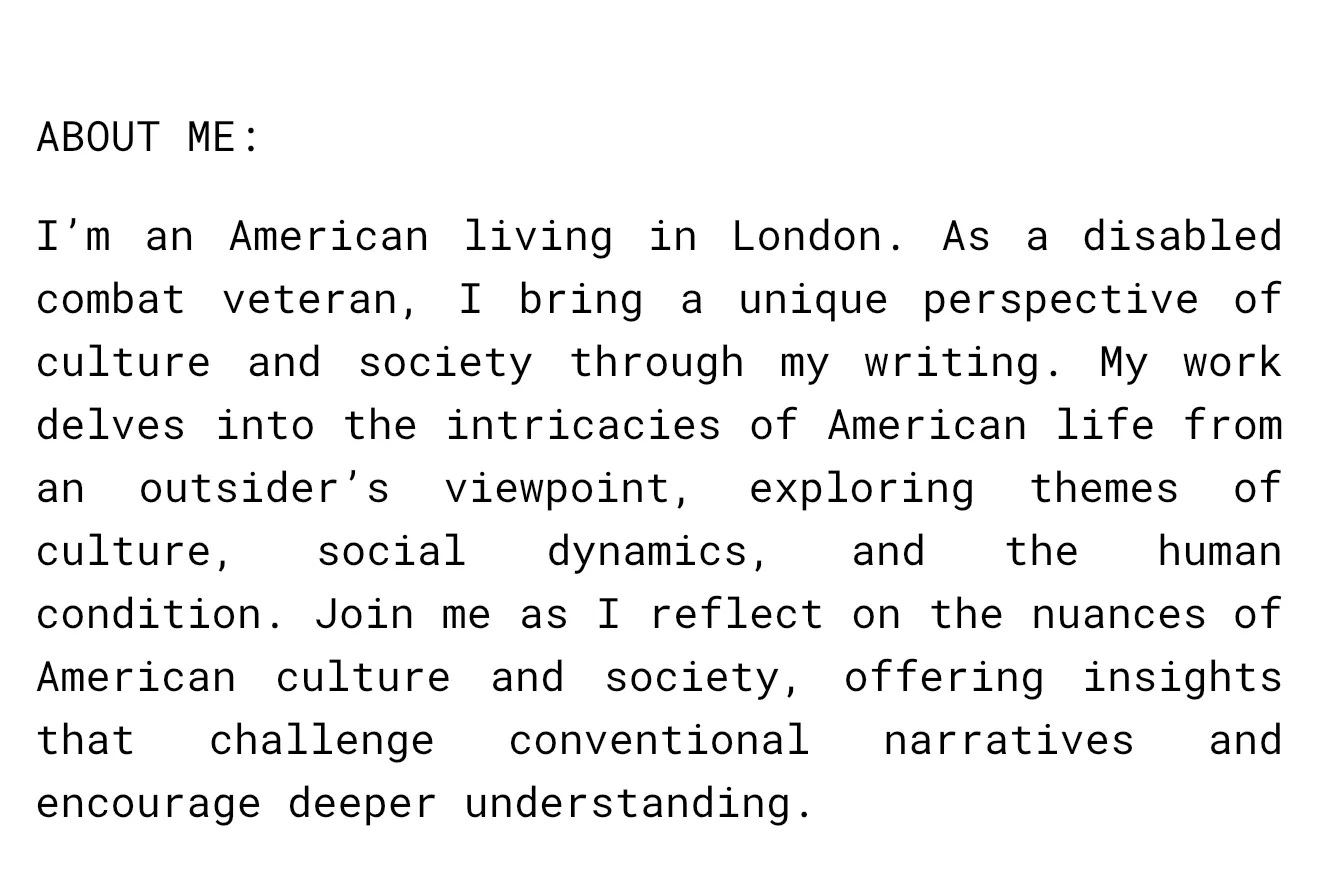Why Do I Choose To Say "Merry Christmas" Instead of "Happy Holidays" or "Season's Greetings" or even "Bah Humbug" à la Ebenezer Scrooge in a Woke Society?
Amid songs about a jolly old fat man, flying reindeer, and talking snowmen, one question looms over the holiday season. No, it is not whether we have been naughty or nice. And it is not the question Bob Geldof posed in Do They Know It’s Christmas? The real question is simpler: Should we say “Merry Christmas,” “Happy Holidays,” or “Season’s Greetings”?
Recently, I did some early Christmas shopping which explains why I am lying in bed fighting the flu as I write this essay. Stepping into a big-box store, I was surrounded by fake Christmas tree displays, plastic candy canes , and workers dressed as elves. Then there was the incessant Christmas music everywhere I turned. I am force fed Mariah Carey’s All I Want For Christmas for six plus weeks much like a goose being force-fed before having its liver turned into foie gras. There is nothing joyous about being made to listen to Christmas music in every public space you inhabit against your will.
As I walked into the Walmart, a cheerful [elderly] elf in a blue vest greeted me with an uneasy “Happy Holidays.” I froze for a moment, puzzled by the words.
“Happy Holidays?” I thought. “What did that elf just utter to me?”
Here I stood, surrounded by decorations celebrating Christmas and I do not even get a “Merry Christmas!” The greeting felt neutral, as if avoiding what the entire store was celebrating. What other holiday was represented here? Was it Hanukkah? Diwali? Or Festivus?
It struck me odd that the elf likely did not choose the greeting but instead played it safe. Retail workers often bear the brunt of the holiday chaos, and, after years in the hospitality industry, I understand the pressure. Saying “Happy Holidays” and “Season’s Greetings” most likely felt the easiest way to avoid upsetting anyone. It is a common approach during December, a time when many grow hypersensitive to the season’s intensity.
But this strategy strips the greeting of warmth. “Happy Holidays” feels impersonal, a placeholder rather than a heartfelt exchange. Based on my experiences living abroad for half my life and marrying into another culture, people respond better to sincerity. A greeting like “Merry Christmas” carries a personal touch that connects directly to the joy of the season.
America's approach to the holiday season rests on Christianity—as does most of the West—missing those who celebrate in other ways such as celebrating Christmas on January 7 in Ethiopia or not celebrating at all. Many people outside the Christian faith embrace Christmas. Studies from Pew Research show that 81 percent of non-Christians in America celebrate Christmas, including 73 percent of Hindus and 76 percent of Buddhists. One-third of Jewish Americans report having a Christmas tree in their homes.
This shared celebration makes Christmas unique. It is not a Christian holiday anymore; it has grown into a cultural event that brings people together. The prominence of Christmas though can overshadow other celebrations during December. Holidays like Hanukkah and Kwanzaa—as well as Diwali, and Ramadan at times—sometimes feel invisible in comparison.
When holiday greetings become overly cautious, they miss an opportunity to celebrate diversity. As an American living in London for the last decade, I observed people freely greeting each other with “Happy Diwali” or “Eid Mubarak,” even if they do not observe those holidays. These greetings reflect respect for different traditions without diminishing one’s own. Why, then,does America often shy away from “Merry Christmas”?
The difference lies in America’s deep connection to Christianity. While freedom of religion is central to American values, it sometimes leads to hesitation. People fear offending, even unintentionally, so they stick to generic phrases like “Happy Holidays.” But this fear robs holiday greetings of their cultural significance, turning them into lifeless words.
Saying “Merry Christmas” is not about excluding others. It is an authentic expression of goodwill tied to a particular tradition. Just as “Happy Diwali” celebrates Hindu culture, “Merry Christmas” acknowledges the Christian roots of a holiday that has become more than a religious event. Neutral phrases, while well-meaning, can erase the unique traditions that make each celebration special.
This shift toward neutrality reflects broader societal pressures. Businesses, for example, often prioritize inclusivity to avoid controversy. While this intention seems admirable, it raises questions: Does aiming for neutrality foster inclusivity? Or does it dilute the richness of cultural expression?
America’s ties to Christianity further complicate this issue. Congress begins sessions with prayer. Courtroom oaths require a hand on the Bible. Even our money carries the phrase “In God We Trust.” These symbols point to Christianity’s influence on American culture. Yet, the First Amendment ensures freedom of religion, granting individuals the right to express or withhold their faith.
This freedom means I can choose to say “Merry Christmas” without fear of backlash. It also means others can greet me with “Happy Hanukkah” or “Season’s Greetings” without worry. However, while the First Amendment protects this right, social norms often push people toward vague, non-committal expressions.
The rise of what some call the “culture wars,” infamously championed by Bill O’Reilly, Fox News, and most of the Conservative Party is one of the best pieces of Yuletide fiction although my favorite Christmas fiction is the How the Grinch Stole Christmas and the twenty four-hour marathon of A Christmas Story. Their campaigns frame neutral holiday greetings as part of a broader erosion of traditional values. Whether one agrees with their stance or not, it highlights the tension between preserving cultural traditions and accommodating modern diversity.
Thomas Jefferson’s 1802 letter to the Danbury Baptist Association spoke of a “wall of separation between church and state.” This principle doesn’t aim to erase religion from public life but to protect religious expression from government interference. It is a reminder that religious celebrations should thrive without fear or restraint.
Living in London for the last ten years, I see that the UK is fighting their own “culture war.” America’s “culture war” is against creeping-secularism—no Christmas trees in the parks, no decorations in the work place, or in the class rooms—not really against immigration as most of America’s immigrants are from Christian countries south of the border.
As for the UK’s “culture war,” Christians have had to metaphorically tiptoe around celebrating Christmas—much like when Mary and Joseph fled to Egypt to save Jesus from bloodstained tyrant named Herod who dispatched soldiers to Bethlehem with orders to find and kill the future King—by uttering obscenities such as, “Happy Holidays” and “Season’s Greetings” for fear of offending the thin-skinned, non-Christians. Of course this is hyperbolic but some people would have you believing this.
When we let fear guide our holiday greetings, we lose something important. The words we choose matter. They carry meaning, history, and emotion. Saying “Merry Christmas” is not about celebrating a holiday; it is about connecting with others through shared traditions.
In America, nearly half of people (52 percent) say it does not matter how stores greet them during the holidays, while about a third (32 percent) still prefer “Merry Christmas.” These numbers show a shift toward indifference, but they also highlight the importance of choice. Everyone should feel free to greet others in a way that feels genuine to them.
The phrase “Happy Holidays” has its place. It works as a catch-all for the season’s many celebrations. But for me, “Merry Christmas” captures the spirit of the season. It is more than a phrase; it is a reflection of joy, goodwill, and faith.
America’s freedom allows for this kind of expression. It is a freedom many fought and died to protect. Honoring that legacy means embracing the right to celebrate—and share—our traditions.
In saying “Merry Christmas,” I acknowledge the holiday’s origins and express my own beliefs. But more importantly, I extend a message of goodwill that transcends religious lines. After all, the heart of Christmas is not about exclusion; it’s about connection.
As the holiday season unfolds, let us remember what makes it special. Whether we say “Merry Christmas,” “Happy Hanukkah,” or “Season’s Greetings,” let our words carry meaning. Let them reflect the traditions that bring us joy and the freedom that allows us to share them.
2023© ElbyJames. CC BY-SA 4.0




I”ve been sick throughout the Christmas season so I haven’t been able to post much. Because of this, I decided to post more Christmas-themed articles during the twelve days of Christmas, December 25th to January 5th along with a bonus.
The twelve days of Christmas is the real and true Christmas season, not the capitalistic, consumerist Black Friday shopping season the media and corporation leads us to believe.